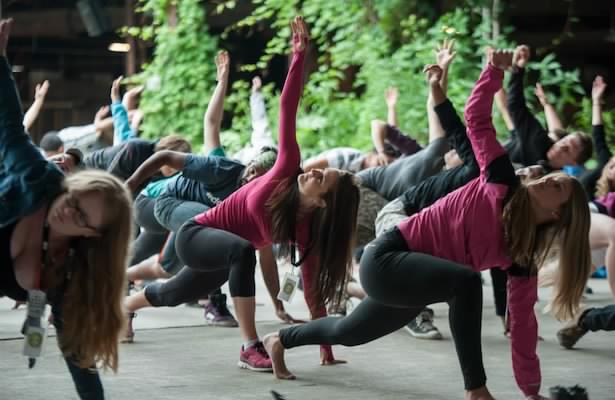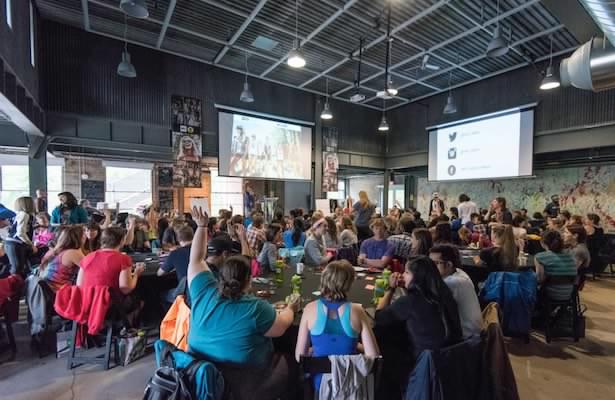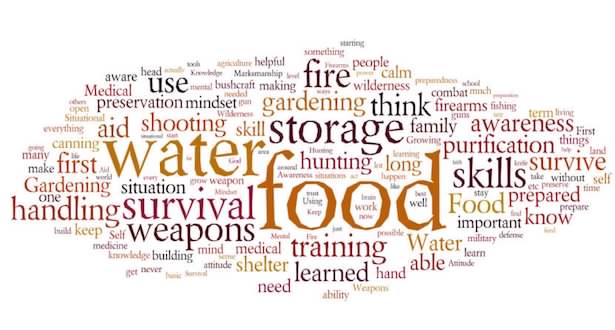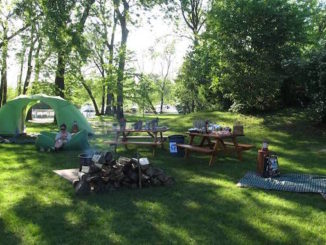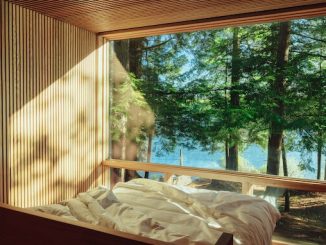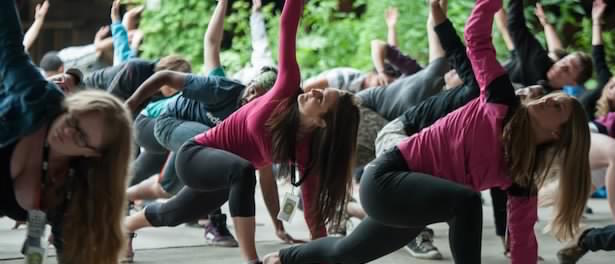
Mountain Equipment Co-Op wants to help young adults get outside and enjoy our outdoors. The Vancouver founded retailer has started a series of events that aim to create new programming to encourage people to take advantage of our awesome country.
They do this by having camp-out events across the country in which participants brainstorm ideas for projects that would excite people to learn about and experience the outdoors. The ideas are voted on by attendees at the event and the winning projects will receive funding to make them a reality.
The Toronto camp-out took place in June at the Evergreen Brickworks with over 100 participants taking part in the activities and working on the outdoor engagement projects.
I chatted with Andrew Sutherland at MEC about the event.
***
How were MEC Outdoor Nation projects developed and proposed?
During the Weekend events we get into groups and work together to develop project ideas with the goal of getting other young people outside. The different project groups then pitch their ideas to everyone attending and a vote determines which projects will be funded. Those that receive funding will be responsible for using the funds to make their project a reality. MEC is there to help along the way if needed.
What age group are you targeting for this and why?
MEC Outdoor Nation is open to 19-30 year olds. It’s all about addressing the declining physical activity levels among young people – the fastest of any other age demographic. According to Stats Canada, almost half (40 per cent) of young adults (ages 20-34) were considered completely inactive.
How many ideas will be selected for funding?
We provide $10,000 in funding per Weekend. During the weekend, we give $1000 to the three projects that receive the most peer votes. After the Weekend, participants have the chance to apply for the remaining $7000 to make even more projects a reality.
How many ideas for engaging people with the outdoors were proposed?
We had 19 projects proposed at the Toronto MEC Outdoor Nation Weekend.
What have been some of the hot topics for ideas?
We are seeing a number of proposals that use technology to inspire others to be outside. For example, in Montreal MEC is funding a project called Out There. Out There is an app that links outdoor enthusiasts together based on geography – “à-la Tinder”. Instead of looking for a date, users can connect with others who enjoy the same types of activities or are experts at something others lack knowledge in. Users will leave reviews about their experiences with other users to help ensure positive experiences, similar to Air Bnb.
How did participants of the MEC Outdoor Nation Weekends celebrate the outdoors?
We celebrated with good food, live music from The Elwins and inspiring talks from adventurers like freestyle kayaker Kalob Grady, who is also a MEC Ambassador.
How were participants selected?
All MEC Outdoor Nation participants apply via our web site outdoornation.mec.ca.
Activities that took place in Toronto?
The MEC Outdoor Nation Weekend in Toronto included SUP, biking, trail running, yoga, climbing and ping pong! Our friends at Surf the Greats also lead a workshop about how to take your passion and turn it into action. Truly inspiring!
***
I wanted to learn more about these ideas that were created so I chatted with one of the project leads about a Survival Skills Set Festival that is being organized.
The Survival Skills Set Festival will be a festival in Toronto that is easy to access, open to the public and a place where people can learn a variety of skills from simple survival skills to filleting fish. The idea is to make participants feel more comfortable getting outside beyond the city. There will be live music and other incentives to get people from a variety of backgrounds interested in attending.
Will this be a MEC event or a general outdoors festival gathering many brands together?
MEC is supporting us through the grant we won at MEC Outdoor Nation Toronto and we are also reaching out to other community partners who can help make the festival an awesome experience. For example, we’re looking to incorporate good food, tunes, drinks and we’d love to be able to offer a means of transport for those who need it.
Skills
What outdoor skills will be taught?
We are still recruiting teachers for this event, so we’re happy to hear from people who would like to share their skills. Based on the teachers we have, our current course offerings are:
-Fishing: casting, tying hooks, preparing fish. -Fire: friction fires, hand-drill, bow-drill, making tinder. -Shelter: emergency shelters, lean-to, tarp-tepee’s. -Holistic remedies: first aid, natural insect repellent, foraging basics. -Wilderness Confidence: basic map/compass skills, foraging basics, wilderness self defense (bear spray, food etiquette, air-horns) -Water: preparing safe water, finding water, crossing water in improvised situations.
What skills are important for all people to be familiar with when heading into the woods/wildnerness?
I think all of these survival skills in our course selection are important because most people who are put in emergency survival situations were not planning on it.
Our goal is to make people more confident in they’re ability to survive using their own two hands. For example, people don’t realize how much nature can provide for us, even in an urban setting there are many places you can go to search for holistic medicines and edibles. Our foraging basics class reveals what plants are good for you and what plants can have negative side effects. Once people are comfortable interacting with nature, I think they will be motivated to explore more of this great country and it’s epic wilderness.
Tools to always have in the woods?
I would recommend having the following tools on you, or in your vehicle at all times, just in case a emergency survival situation occurs.
1) A large fixed-blade knife.
For cutting wood, starting fires, self-defence, self-confidence, food preparation, certain medical emergencies, signaling for help (if your knife is chrome or shiny), digging, making traps, and carbon steel knives can be used with quartz to make sparks.
2) Flash-light.
Besides the obvious seeing in the dark, flash-light batteries can be removed and help you start a fire, the light can be used to temporarily blind an animal if you are being attacked, and it’s another way to signal for help.
3) A Tarp
A tarp can be used for many things: a rainwater collector, a shelter, a makeshift boat if you need to cross a body of water (called a coracle), a roof for cooking in the rain, a sleeping bag or blanket if you’ve created a make-shift shelter, a snow fence if your out in the winter on a windy day, and a fishing net if your willing to poke lots of small holes in it
4) Rope or Paracord.
Useful for hanging food in a tree away from hungry animals, helps with shelters, nets, makeshift fishing line, makeshift bow string, medical tool for splints, traps, can be a good dry material for emergency fire starting, tying together your tarp-boat, climbing, crossing fast moving rivers, cloths line, most ropes can be splayed and used for thread which is also good for: fishing line, sewing, repairs, and many other things.
All four of these items can be purchased easily for under $100 at MEC and may literally save your life one day.
Where will these be held? How often?
We still have not confirmed the event location, but are in talks with some of the coolest spaces in Toronto. We are working to make this an annual event.
Any time frame on when it will happen?
Our tentative date for this festival is Saturday, May, 21st, 2016. It will be an overnight camp-out, with some morning activities on Sunday. The festival would wrap up around noon on Sunday and people will be welcome to stay to enjoy the day.
How can our readers get involved or stay tuned for more info?
People can visit and join our start-up page at: www.facebook.com/groups/3sfest

